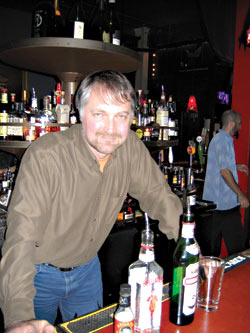I’ve been Seattle Weekly‘s spirits columnist for almost a year now, so I feel I’m qualified to say that most of the cocktails made in this town are just not very good. Many are sloppily put together, run too sweet, and/or suffer from what mixologist Ryan Magarian of Liquid Kitchen calls the “Seattle Muddle”: excessive, showy shaking that leaves icy shards in drinks ordered “up.”
However, there is hope for cocktails in Seattle, because the Cocktail Messiah resides in this very town, goes by the name of Robert Hess, and is here to help you. You can take hands-on classes with him for a fee or tutor yourself on his Web site (DrinkBoy.com) for free. Via his site, you can also link to his cocktail forum on MSN.
Hess’ interest in cocktails comes from the culinary side. (“My ex-wife was at the Ritz Escoffier culinary school, but I was the better chef.”) His interest grew as he realized that “cocktails are like cooking, because you are participating with what’s in the glass, while with wine you don’t.”
The Pacific Northwest, a region so finicky about its wine and coffee, should be a natural home to sophisticated cocktails. For whatever reason, though, Hess says cocktails here are “in the canned-coffee stage. Restaurants treat cocktails as a waiting room for their dining experience.” Some managers tell the bar staff to cut corners, which is equivalent to “telling the chef that to cut costs, he would have to use instant rice.” In fact, “a cocktail is a better culinary reflection of the establishment than wine. Wines can be picked like produce, whereas a bartender is participating in a cocktail.” Cocktails have greater flexibility than wine, too; they can be tweaked, modified to suit the dish with which they are being paired.
Hess used to be frustrated with cocktail culture at large: “I said, ‘OK, bartenders are idiots and I will just have cocktails at home.'” That all changed when he met bartender Colin Field at the Ritz Hotel’s Hemingway Bar in Paris. “I started looking for bartenders who had his kind of spark: people who embrace the idea that a cocktail is not an alcohol delivery vehicle, it’s a craft.”
Hess is constantly roving bars and chatting with people while consulting his pocket PC, which now has 4,000 recipes on it, collected since 1997. When he goes to parties, he asks people to name a spirit they don’t like and then whips up a series of drinks using only that spirit to demonstrate that it’s not the booze but the bartender that makes the difference.
Hess has his own favorite spots round town, but he says you can learn a lot about the art of the cocktail in most bars, if you cultivate the bartender, ask questions, and are willing to try different approaches to a drink in order to compare them. Still, in his spare time from working for Microsoft (he calls himself “a developer/evangelist”), he’s taken to holding cocktail clinics for people who want to learn more about the craft. At the most recent (at Mona’s in the Green Lake area), a mixed crowd of ordinary consumers and industry folk sampled an original martini, a champagne cocktail, an old-fashioned, a mai tai, and a Harrington (vodka, Chartreuse, and Cointreau)—a wide spectrum of drinks to “exercise people’s palates.”
His next seminar will be held Tuesday, March 7, at the downtown Mayflower Park Hotel; it’s the first in a series of seminars organized in association with the New York–based Museum of the American Cocktail, covering the history of the cocktail, how to stock and use a home bar, a whole program devoted just to martinis, and even “Cocktails: The Next Generation.”
“I think we are right on the verge of seeing things pop,” Hess says. We’ll drink to that.





